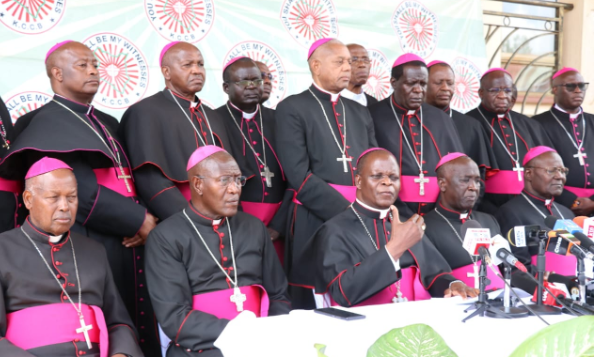
Last week the Kenya Catholic Bishops Conference issued a scathing attack against the government. In a statement they used the words “Orwellian dystopian authoritarian” state.
The Bishops allegedly accused President William Ruto of causing and presiding over a plethora of ills and misdeeds.
Chief among the accusations was the alleged government habit of ‘leading by lies’. The men of cloth opined the President and his government officials have developed a tendency of making development promises without the intention of keeping them.
The presumed objective is therefore to deceitfully keep the citizens happy. They further claimed the only programmes implemented are those that heap additional burden to the poor mwananchi through heavy taxes.
They faulted the new housing, health and education funding policies. Their position was the Kenya Kwanza administration has made decisions leading to the polarisation of the country along ethnic lines.
They contend the political tensions within the government and public institutions are a threat to national stability and progress.
The government was quick in response. Each ministry where flagship programmes are domiciled issued a detailed account of the project status.
The President himself further clarified the importance of these noble programmes. In fact, he said the previous two successive administrations initiated the same but without much success.
He said the social projects are critical to achieve Vision 2030 and therefore he is committed to their full implementation.
Over the weekend, he attended church services in Embu and later in Nairobi. At the Nairobi Soweto Catholic Church, the President acceded to the presiding priest’s request for church development support.
During the service, Ruto donated Sh600,000 to the church choir, while Nairobi Governor Johnson Sakaja gave Sh200,000. Ruto at the same time gave Sh2 million to construct the parish priest’s house and pledged another Sh3 million for the same.
The head of state also promised to deliver a bus to the church in January. In a surprising turn of events, the Catholic Archdiocese of Nairobi has since rejected the cash and other donations made by the President and the governor.
Bishop Philip Anyolo said the donated cash would be returned and added that the promised bus would not be accepted.
Until President Daniel Moi came into power in 1978, the church always had a patron-client relationship with the government.
It arrived on the shores of the Indian Ocean ahead of the white settlers and the colonial government. It therefore performed the welcoming ceremony for the first representative of the British monarchy.
It is, therefore, not a coincidence that the Anglican Church Bishop’s residence shares a fence with the seat of power, State House.
The Apostolic Nunciature to Kenya is an ecclesiastical office of the Catholic Church. It is a diplomatic post of the Holy See, whose representative is called the Apostolic Nuncio with the rank of an ambassador.
The residence and office is a stone’s throw from State House Road and so is the Milimani AIC Church. The first colonial government comprised of the Governor, the Railway’s Chief Engineer and Archbishop of Canterbury’s Representative.
The church was instrumental in the effective running of the government at the early stages of Kenya’s development as a nation-state. It had the resources that went a long way in establishing education and health care systems.
The ecumenical services and evangelism also helped pacify the restive native populations through the teachings of the gospel.
In return and appreciation, the government granted the church inordinate natural resources expropriated from the local ethnic nationalities.
However, this church-government relationship in early Kenya is not anything unique. It is historical. The church has always been patronised by the government. It is a critical component of the state as a key non-state actor and civil society organisation.
The Christian Church, as is known today, flourished under the protection and support of the early rulers of the world.
The British monarch, currently King Charles III, is the Supreme Governor of the Anglican Church and nominates the Archbishop of Canterbury, the most senior cleric.
The governing structure of the church is based on dioceses, each presided over by a bishop. [Archbishop of Canterbury Justin Welby resigned on November 12 for covering up a sexual abuse scandal.]
This structure is mirrored in the Catholic Church leadership. It should be remembered the ACK broke away when King Henry VIII rejected the authority of the Roman Catholic pope in Rome and established an independent church in England on account of a marital dispute.
The early church faced many tribulations in its growth. It had started in Judea, a Jewish territory under the Roman Empire.
The founder, Jesus of Nazareth, was himself executed through crucifixion as provided under the Roman laws. His successors would later suffer the same fate and all manner of horrifying persecution at the hands of both Jewish and Roman rulers for their beliefs that were considered unorthodox.
Later Emperor Constantine the
Great embraced Christianity as a
religion through the influence of
his mother, Helena. He decreed
Christianity to be the official faith
of the empire and this catapulted
the religion to the highest ranking.








![[PHOTOS] Gachagua warm reception in Nyandarua](/_next/image?url=https%3A%2F%2Fcdn.radioafrica.digital%2Fimage%2F2025%2F04%2Fc2a8c64d-5577-4768-a0ac-513c8876c288.jpeg&w=3840&q=100)


